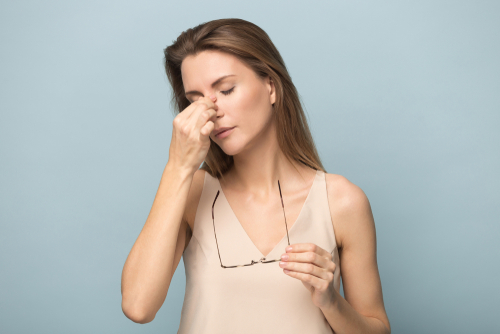Posted by: Associates in Ophthalmology (NJ) in Uncategorized
Dry eyes and allergies often have similar symptoms, which can make it difficult to distinguish one from the other. Having one can also make you vulnerable to the other.
If you already suffer from dry eye, exposure to allergens can worsen your symptoms. Keep reading to learn if dry eyes and allergy symptoms are connected!
What Does it Feel Like to Have Dry Eyes?
Dry eye syndrome is a common eye condition caused by a lack of tears or a lack of quality tears. In order for your eyes to be adequately lubricated, your tears must be well balanced with the essential components.
If your tears are not moisturizing the surface of your cornea, your eyes will feel dry and irritated. Some common symptoms of dry eye syndrome are:
- Blurry vision
- Redness in your eyes
- Eye irritation
- Frequent tearing
- Feeling like there is something in your eye
There are many factors that can contribute to dry eye syndrome, including age, environment, and medications. You may be more at risk of experiencing dry eye symptoms if you are pregnant or breastfeeding, as hormone fluctuations can affect your vision.
If you are experiencing any of these symptoms, it is essential to have an eye exam. Your eye doctor can determine the root cause of your symptoms and develop a treatment plan.
Differences Between Dry Eyes and Allergies
Seasonal allergies can cause symptoms similar to chronic dry eye. Due to this, it can often be hard to tell what’s causing your symptoms.
Both dry eye and allergies can cause tears and redness. You may also experience frequent headaches, eye pain, and blurry vision.
However, people who experience eye-related symptoms from allergies often report greater eye itching than those with dry eye syndrome. A consistent itchy or scratchy feeling in your eyes may mean that the symptoms you are experiencing result from allergies.
The best way to determine whether your symptoms are due to allergies or dry eye syndrome is to visit your eye doctor for an exam. At this exam, your eye doctor will examine your eyes and develop a treatment plan depending on the root cause.
Help Prevent Dry Eye
Being proactive can help improve your symptoms and prevent your dry eyes from worsening. You can start by avoiding situations that may irritate your eyes.
One simple change you can make is avoiding direct streams of air. Ensure the air from your car heater, air conditioner, or fan isn’t pointed directly at your eyes.
Reducing your screen time and blinking frequently can also improve your dry eye symptoms. Small lifestyle changes may also help prevent dry eye symptoms.
Your eye doctor may instruct you to increase your use of artificial tears to help aid in lubrication of the cornea. If your symptoms result from allergies, it’s best to avoid potential allergens and not go outside on days where the pollen count is high.
If your symptoms do not seem to improve with these changes, your eye doctor may implement other treatment methods, like prescription eye drops.
Are you experiencing symptoms like eye irritation, itching, or tearing? Schedule an appointment at Associates in Ophthalmology in Livingston, NJ, today to determine if you have dry eye syndrome or allergies!


